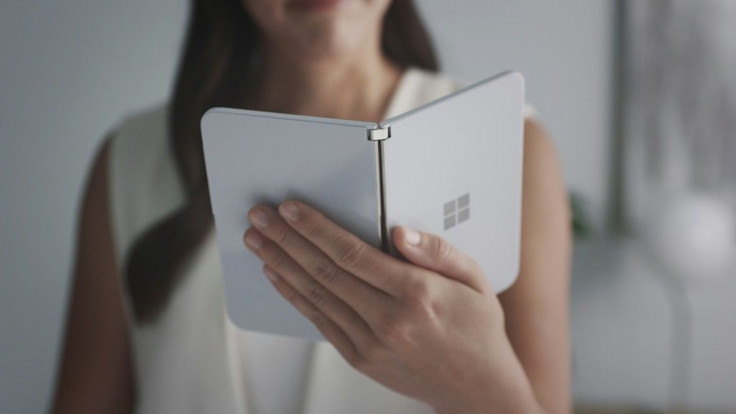3 Reasons Microsoft's New Folding Smartphone Could Be A Big Success
Microsoft (NASDAQ:MSFT) is a popular stock in the tech industry, yet it hasn't been a big player when it comes to the cellphone market.
Previously, the company failed miserably with its Windows phones, capturing little demand in a market that's been crowded with Android- and iOS-based phones. Its Lumia phones have been discontinued as consumers showed little interest in the tile-based interface that was modeled after Windows 8, which users hated and which had worse adoption numbers than Windows Vista.
Presumably, Microsoft feels it has learned from those mistakes, because last week it announced some new products at its annual product event, including a folding phone. While it may seem like another long shot for the company to grab market share from Apple (NASDAQ:AAPL) and Alphabet (NASDAQ:GOOGL)(NASDAQ:GOOG), here are three reasons why Microsoft's new phone, the Surface Duo, could be a success.
1. It has ditched Windows software for Android (sort of)
One of the biggest reasons Microsoft's Lumia phones failed was that there just weren't many apps for it as developers weren't convinced the market for Windows-based phones would be popular enough. With Apple's iOS being the dominant software at the time and Android on the rise, there would have been little motivation for developers to work on a third version of their apps that would work on Windows phones.
With the Android market having grown significantly and now having even more apps than iOS (2.7 million versus 2.2 million), the new Microsoft device isn't going to run into the same challenges its predecessors faced. However, Microsoft isn't ditching Windows entirely, as it did say that a Windows operating system would be incorporated into the software as well and that Microsoft software like Office would be available for the device.

2. Size matters
One trend that's been clear over the years is that phones, or phablets, are getting bigger, and consumers are showing significant demand for them. The folding phone is the latest trend to hit the industry, and it could prove to be very popular.
It offers a balance between having a large screen and still being able to fit the device in your pocket, which is one of the things Microsoft promises as a feature of the phone, which has two screens that are 5.6 inches each.
Samsung launched a folding phone earlier this year; however, it ran into issues with its screen, delaying its sales.
3. Surface-like functionality could be a difference-maker
Microsoft's Surface devices have been very popular among consumers, and they have been key to the company's impressive growth numbers. What has made the Surface so successful is its flexibility in being able to convert from a tablet to a laptop and its ability to run Microsoft Office apps and act like a normal laptop.
If the Microsoft devices can offer users more functionality than they're getting with their regular phones, it could be a game-changer and turn Microsoft into a big threat in the handheld market. Ultimately, that's going to depend on what its hybrid Windows/Android software is going to look like.
Key takeaway
Microsoft is expecting to have its folding phone available later this year, but no pricing was announced. The Duo has a lot of great features, and it could open up some great opportunities for Microsoft now that it won't be slowed down by an unpopular operating system.
Suzanne Frey, an executive at Alphabet, is a member of The Motley Fool’s board of directors. Teresa Kersten, an employee of LinkedIn, a Microsoft subsidiary, is a member of The Motley Fool’s board of directors. David Jagielski has no position in any of the stocks mentioned. The Motley Fool owns shares of and recommends Alphabet (A shares), Alphabet (C shares), Apple, and Microsoft. The Motley Fool has the following options: short January 2020 $155 calls on Apple, long January 2020 $150 calls on Apple, short January 2020 $155 calls on Apple, long January 2020 $150 calls on Apple, and long January 2021 $85 calls on Microsoft. The Motley Fool has a disclosure policy.
This article originally appeared in The Motley Fool.











